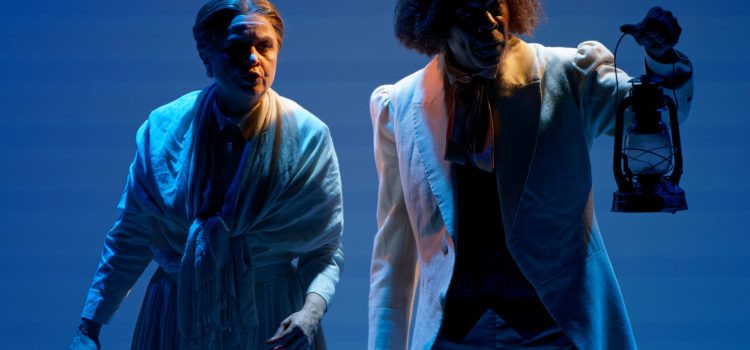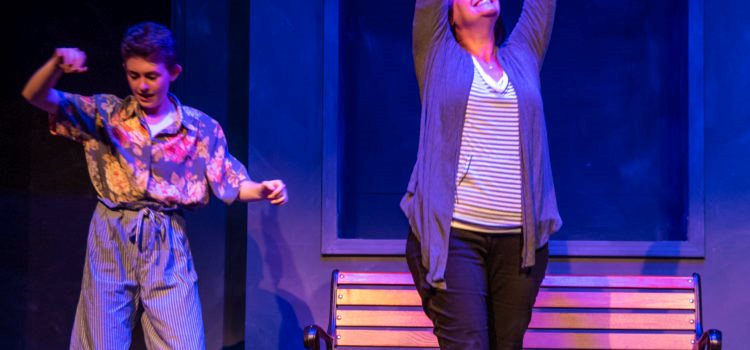By Andrea BraunContributing Writer
The title of the play is based on Frederick Douglass’ exhorting his followers to “Agitate. Agitate. Agitate.” This was later in his life, long after he met and became friends with Susan B. Anthony who was already doing just that in her late 20s.
Their friendship would last 45 years and their goals remain the same, though there are bumps in the road: both supported abolition and women’s rights. But it wasn’t all sweetness and light between them because while their causes meshed, their priorities didn’t always do the same. The Agitators now playing at Upstream Theater is an examination of their near-lifelong connection, allowing both of them time to make their points. Perhaps a bit too much time, however, because much of the play seems rather like a lecture. This is is certainly not to say it isn’t mostly well-done, disturbingly timely, and certainly worth a couple of hours of your time.
Douglass (J. Samuel Davis) is close to Anthony’s (Erin Kelley) father, an outspoken abolitionist, and a Quaker. Because of her religion, she tells Douglass early on, even if she could vote, she wouldn’t because Quakers are supposed to be apolitical. Later, she would leave the Society of Friends and change her mind about voting, but when we meet her, the women’s rights question is her priority, along with abolition. Act I begins at the Anthony residence and covers 1849-1869. Act II picks up in 1870 and takes us through 1895.
Playwright Mat Smart has a tough job here: The time
period covered is so long that even though projections help us with what year
it is and where we are, we still get the impression that these two spend a
great deal of time together expressing their views on civil rights. The fact
is, often they would go years without seeing each other, sometimes because they
were busy, other times, because they were angry.
Their longest disagreement was about Douglass’ support
of the 15th Amendments to the Constitution which proposed enfranchisement
of black men but not any women. Unsurprisingly, Anthony takes umbrage at his
support of what she considers a half-measure. She is also angry that Douglass
is accepting financial support from a man she considers a misogynist. This
quarrel leads to their longest period of non-communication.
He spoke at her
conferences and she appeared at his. Both of them were among the best known
figures of their time. Anthony was the only leader in the 19th
century women’s movement culminating in the meeting in Seneca Falls, NY in
1848. And one should not think that Douglass didn’t support Anthony fully in
her drive for equality; rather, he thought it was too soon and would come when
the time was right. Of course, women got the vote in 1920, long after these
icons were gone.
Photo by ProPhotoSTLAs for any sense of a love story, the affection between the two is palpable, but Douglass was happily married to his wife, Anna (a free black woman who helped him attain his freedom) and after she died, a much younger woman. He also was attractive to women and there is speculation that he had others, but one of them was NOT Susan B. Anthony.
They both wrote books—he a four-volume autobiography; she, in collaboration with other leaders of the movement, a multi-volume treatise on her own beliefs and the causes the women held dear. One good joke is that neither reads the other’s work.
There are more moments of humor that leaven the
proceedings, my favorite being Douglass explaining baseball to Anthony at his
son’s game. It is amusing, until due to a racist incident, it isn’t. They tell
each other bad jokes and engage in teasing banter. At one point, when he is 76
years old, Anthony gives Douglas a pair of ice skates. He is, of course,
nonplussed. But she was a great believer in physical exercise and the moment
demonstrates both their similarities and their differences.
The atmosphere of the play is enhanced by the musical compositions of and performance by Syrhea
Conaway, a well-known and versatile St. Louis artist. When we first see
Douglass, he is carrying a violin. At several points in the show, he appears to
play his instrument in duets with her that can run the gamut from ethereal to
anger. She uses percussion to round out the sound, and it works beautifully.
The set itself is simple—beams, planks and boxes which get shifted around
often—perhaps rather too often, as it can become distracting. There is a
connection to the story, however, when Anthony tells a story involving a suitor
who wooed her with a warmed plank.
Stage Manager Patrick Huber is responsible for the
lights, as well is the set, and they provide a proper atmosphere, if too dark
at times. Michele Friedman Siler’s costumes are historically accurate except
for the anachronistic zippers on Anthony’s boots. Lisa Tejero directs, assisted
by Patience Davis. They keep things moving to the extent that it is possible
when there are so very many words for the actors to say, but despite their
efforts, the production still seems static some of the time. The fact that it’s
a running trope that Anthony cannot sit down is, I assume, supposed to give us
the illusion of motion.
If there are better actors than Kelley and Davis to
play these parts, I don’t know who they are. There were a few stumbles at the
beginning, but when the two hit their stride, all was well from a performance
standpoint. I believed them and more important, I think THEY believed them too.
The last public statement Douglass made was at Seneca Falls saying “When I ran away from slavery, it was for myself; when I advocated emancipation, it was for my people, but when I took up for the rights of women, self was out of the question, and I found a little nobility in the act.”
He and Anthony are buried in the same cemetery in Rochester, NY, her home town. Together in death, as in life, one wonders what they might have to say about racism and misogyny in 2019.
“The Agitators” is at Upstream Theater through Oct. 13 at the Kranzberg Arts Center. You may contact upstreamtheater.org

Lynn (Zipfel) Venhaus has had a continuous byline in St. Louis metro region publications since 1978. She writes features and news for Belleville News-Democrat and contributes to St. Louis magazine and other publications.
She is a Rotten Tomatoes-approved film critic, currently reviews films for Webster-Kirkwood Times and KTRS Radio, covers entertainment for PopLifeSTL.com and co-hosts podcast PopLifeSTL.com…Presents.
She is a member of Critics Choice Association, where she serves on the women’s and marketing committees; Alliance of Women Film Journalists; and on the board of the St. Louis Film Critics Association. She is a founding and board member of the St. Louis Theater Circle.
She is retired from teaching journalism/media as an adjunct college instructor.


